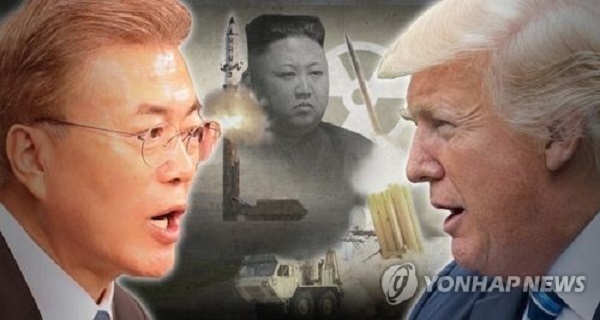South Korean President Moon Jae-in on Thursday ruled out the possibility of war on the Korean Peninsula, saying the United States has agreed not to take any military action against North Korea without Seoul's consent.
He warned Pyongyang against crossing a "red line," by which he meant the weaponization of nuclear warheads and intercontinental ballistic missiles.
"I say this with confidence that there will be no war on the Korean Peninsula ever again," the president said in a press conference marking his first 100 days in office.
"The United States and President Donald Trump too have agreed to discuss any options it may take (against North Korea) with South Korea regardless of what kind of options it takes."
Moon's remarks followed a heated war of words between Washington and Pyongyang.
 |
(Yonhap) |
The communist North had threatened to fire missiles toward the US-controlled island of Guam. Trump said the North will be met by "fire and fury" should it continue to make threats against the United States, later adding his country's military options are now "locked and loaded."
Moon insisted the US leader's remarks had been aimed at increasing pressure on North Korea, instead of signaling an imminent military action against the reclusive state.
"The US sought to put maximum pressure and sanctions through the latest UN Security Council resolution," the South Korean leader said. "At the same time, it is seeking unilateral measures, and I believe President Trump sought to pressure North Korea by showing a firm determination. I do not necessarily believe that showed his determination to take military options."
The South Korean leader insisted the US will also consult with Seoul on any military action it may take against North Korea outside the Korean Peninsula.
"Basically, the Republic of Korea is the one directly and mostly affected by North Korea's nuclear and missile issues. But it is also an issue between the North and the United States.
Therefore, should North Korea continue to take provocative actions, or even take an aggressive action against the United States, the US may take appropriate steps," Moon said.
"However, I am saying any military action to be taken on the Korean Peninsula requires South Korea's consent unless it is taken outside the peninsula. Also, even if the United States takes military action outside the peninsula, I am confident it will sufficiently consult with South Korea in advance if such action may increase tension between the South and the North," he added.
The South Korean leader, however, said the North was nearing a red line.
"I believe North Korea completing its development of ICBMs and mounting nuclear warheads on ballistic missiles will mark its crossing the red line. North Korea is nearing the critical point.
And that is why we must prevent North Korea's additional provocations," he said.
"Should North Korea again make a provocation, the North will face further enhanced sanctions, and it will not endure them," Moon added.
When asked about his country's relations with Japan, he reiterated his willingness to improve the countries' cooperation in dealing with various bilateral and regional issues, including the North Korean nuclear and missile provocations.
Still, Moon stressed the need to address the countries' history issues separately.
The president insisted the countries' controversial agreement signed in late 2015 over Japan's sexual slavery of Korean women during its 1910-45 colonial rule of Korea does not override the victims' individual rights to claim indemnity.
Also regarding the issue of thousands of Koreans forced into labor during the period, the president noted his country's Supreme Court's ruling that former agreements between the two governments do not forfeit individual victim's rights to seek compensation from their former Japanese employers.
"Only, what I am stressing is that such historical issues must not be an obstacle to the future-oriented development of the Korea-Japan relations. That is why we must deal with historical issues as historical issues and the countries' future-oriented cooperation separately," he said.
Turning to domestic issues, the president said new economic and welfare policies announced so far under his new government will not require additional tax hikes, at least for now.
"The government has already increased tax rates for the largest businesses. It has already announced a plan to enhance tax collection on the highest-income earners. I believe the various welfare policies announced by the government so far can be sufficiently funded by the proposed tax hikes already announced," he said.
The presidential office Cheong Wa Dae and Moon's de facto transition team earlier noted the new government's 100 policy tasks may cost an additional 178 trillion won (US$156.6 billion) over a five-year period between 2018-2022.
Moon said reducing and rearranging government spending was equally important as increasing tax revenues through tax hikes.
"The plans for tax increases unveiled by the government as of now have been decided to provide the exact amount of additional funds needed by the government," he said.
When asked how his government planned to realize his election pledge of making the nation free of nuclear energy, the president said the change will not be steep.
"The plan is to shut down nuclear reactors now in operation after each runs out of their designed lifespan," Moon said. "The government will gradually reduce the number of nuclear reactors one by one, while creating new energy sources, such as LNG and renewable energy. It is not a plan that will cause a steep rise in electricity rates." (Yonhap)







![[Weekender] Korea's traditional sauce culture gains global recognition](http://res.heraldm.com/phpwas/restmb_idxmake.php?idx=644&simg=/content/image/2024/11/21/20241121050153_0.jpg)
